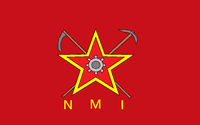New Micronations Internationale
| First Micronational | |
| Intermicronational organisation | |
 | |
| Headquarters | 'New Micronations Internationale' (Discord) |
| Official language | English |
| Ideologies | Socialism Internationalism Communism Estasian Forwardism Arsalanian Trotskyism Picklism |
| Membership | 5 Parties registered at time of dissolution |
| Leadership | (Final) |
| Central Council |
|
| Key events | |
| Foundation | 25 August 2020 |
| Dissolution | 15 October 2021 |
The First Micronational formerly known as The New Micronations Internationale (NMI), was an intermicronational organization that sought to bring leftist micronations together to achieve like-minded goals of cooperation, progress, intermicronational statuses, equality and leftist unity.
The original NMI was established on 25 August 2020 by the Forwardist Republic of Eastasia, the Democratic Republic of Benjastan, the Windovian Commonwealth, and the People's Republic of Arsalania after the original signing of the Yungshin proclamation by the People's Republic of Arsalania and Eastasia.
After a severe loss of activity and usage of the organization and it's institutions, it soon entered a period of stagnancy and inactivity and member parties under the new reformed structure (formed after the July Reformation) had yet to utilize the organization as a platform in any way whatsoever and no activity was recorded for months. It was then feasible to say that the status of the First Micronational was uncertain under the conditions that now presented themselves. As a result, on the 15th of October 2021, The First Micronational was formally dissolved and thus ceased to exist in any capacity.
Structure
The New Micronations Internationale (as it was named originally) consisted of three organs, the Popular Assembly, the Research and Cooperation Wing, and the Union of Parties.
However as a result of reforms enacted as an attempt to revive the NMI which had been stagnating in activity, the organization has been reorganized to only admit leftist political parties rather than entire micronations. Furthermore, the name of the organization was changed to the
"First Micronational"
United Assembly
As a result of the July Reformation,[1] passed with a majority of support from the Central Council, not only was the name of the organization changed, butt a major reorganization took place. The United Assembly was set up with the aim of having a communion of leftist political parties, however, it has yet to see any use and has been 'mothballed' since it's formation. As a result of the creation of the United Assembly, former member states were directed to register their parties for membership of the First Micronational, out of 18 parties to be registered potentially, only five signed for membership in the First Micronational.
Abolished Organs
Popular Assembly (PA)
This assembly consisted of all the delegates from the member states and the member parties, the Popular Assembly's job was to decide on matters that have been proposed by member states. The PA was overseen by the Overseer of Commissions, whose job was to approve delegates to join and keep order in the PA. A micronation could have more than one delegate in the PA based on their population, and at the time it's abolition, the criteria for assigning delegates was 1 delegate each for a population of 12 citizens.
Committee of Cooperation (CoC)
The main use of the CoC was to let members that have decided to join to share projects, topics, and information. In this way, they could learn about each other while progressing.
Union of Parties (UoP)
The UoP was a semi-autonomous organ of the NMI that consists of all the member parties, the UoP's job was to help each other parties to strengthen their influence in their micronation which their party is from. The UoP had the support from member states, and was also under supervision by them.
Member Parties
After the enactment of the July Reformation, the following parties re-submitted their application for membership in the First Micronational:
- Picklista National Liberation Front - Benjastan
- Forwardist Party of Eastasia - Eastasia
- Tree Party - Tesforia
- Socialist Party - Arsalania
- Democratic Socialist Labour - Excelsior
There were still 13 former member states that have not applied for the membership of their political parties in the NMI.
Pre-Reformation Member states
Note: It should be kept in mind that this list was incomplete and at the time of the July reformation, the number of member states was much higher.
- Federated Communes of Abalone
- People's Republic of Arsalania
- Socialist Republic of Augustan
- Democratic Republic of Benjastan
- Federative Republic of Bryantia
- People's Republic of Curacao
- Forwardist Republic of Eastasia
- Autonomous Socialist Republic of Griffasus
- Valencian Republic
Observer states
___________________________________________________________________________________________________